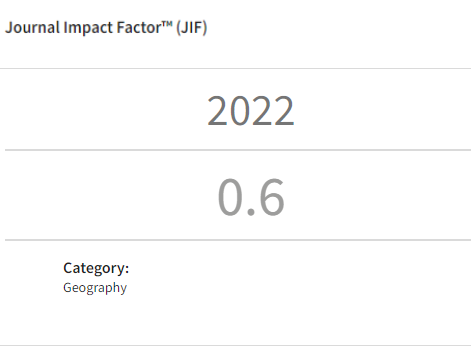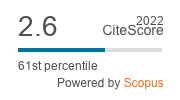New Geographies of Work: Re-Scaling Micro-Worlds
DOI:
https://doi.org/10.18778/1231-1952.27.1.03Keywords:
scale, flat ontology, new work, alternative workplaces, collaboration, social innovationAbstract
The recently emerging new types of collaborative work and unconventional workplaces indicate that shifting social and economic practices have odd spatial implications. The diversity of work, mostly based on hybrid social and economic logics, has brought forth a number of new contextualised spatial constructs in recent years: makerspaces, fab labs, open workshops, and co-working spaces now require detailed analytical reconstruction and conceptualisation. This article is a theoretical discussion of the nature of fluid and contingent spatialisation against the backdrop of binary explanatory categories (e.g. local-global; proximity-distance). Drawing upon modernised concepts of horizontal scaling, we propose a perspective on hybrid work which focuses on contingent multiple, multidirectional and temporal scalings created by a variety of users while developing their own micro-worlds of work.
Downloads
References
AVDIKOS, V. and KALOGERESIS, A. (2016), ‘Socio-economic profile and working conditions of freelancers in co-working spaces and work collectives: evidence from the design sector in Greece’, Area, 49 (1), pp. 35–42. https://doi.org/10.1111/area.12279
Google Scholar
DOI: https://doi.org/10.1111/area.12279
BATHELT, H. and GLÜCKLER, J. (2003), ‘Toward a relational economic geography’, Journal of Economic Geography, 3 (2), pp. 117–144. https://doi.org/10.1093/jeg/3.2.117
Google Scholar
DOI: https://doi.org/10.1093/jeg/3.2.117
BRINKS, V. (2019), ‘«And Since I Knew About the Possibilities There …»: The Role of Open Creative Labs in User Innovation Processes’, Tijdschrift voor economische en sociale geografie, 110 (4), pp. 381–394. https://doi.org/10.1111/tesg.12353
Google Scholar
DOI: https://doi.org/10.1111/tesg.12353
BUDGE, K. (2019), ‘The ecosystem of a makerspace: Human, material and place-based interrelationships’, Journal of Design, Business & Society, 5 (1), pp. 77–94. https://doi.org/10.1386/dbs.5.1.77_1
Google Scholar
DOI: https://doi.org/10.1386/dbs.5.1.77_1
BÜRKNER, H.-J. and LANGE, B. (2016), Configurations of Value Creation in Open Workshops, [in:] WULFSBERG, J.P., REDLICH, T. and MORITZ, M. (eds.), 1. interdisziplinäre Konferenz zur Zukunft der Wertschöpfung, Hamburg: Helmut-Schmidt-Universität, pp. 307–316.
Google Scholar
CASTELLS, M. (2000), The Rise of the Network Society, Oxford: Blackwell Publishers.
Google Scholar
CASTELLS, M. (2010), ‘Globalisation, Networking, Urbanisation: Reflections on the Spatial Dynamics of the Information Age’, Urban Studies, 47 (13), pp. 2737–2745. https://doi.org/10.1177/0042098010377365
Google Scholar
DOI: https://doi.org/10.1177/0042098010377365
CHATTERTON, P. and PUSEY, A. (2019), ‘Beyond capitalist enclosure, commodification and alienation: Postcapitalist praxis as commons, social production and useful doing’, Progress in Human Geography, 44 (2). https://doi.org/10.1177/0309132518821173
Google Scholar
DOI: https://doi.org/10.1177/0309132518821173
DEMARIA, F., KALLIS, G. and BAKKER, K. (2019), ‘Geographies of degrowth: Nowtopias, resurgences and the decolonization of imaginaries and places, ENE: Nature and Space, 2 (3), pp. 431–450. https://doi.org/10.1177/2514848619869689
Google Scholar
DOI: https://doi.org/10.1177/2514848619869689
DURANTE, G. and TURVANI, M. (2018), ‘Coworking, the Sharing Economy, and the City: Which Role for the ‘Coworking Entrepreneur’?’, Urban Science, 2 (3), pp. 1–21, https://www.mdpi.com/2413-8851/2/3/83 https://doi.org/10.3390/urbansci2030083
Google Scholar
DOI: https://doi.org/10.3390/urbansci2030083
FABBRI, J. and CHARUE-DUBOC, F. (2013), ‘The Role of Physical Space in Collaborative Workplaces Hosting Entrepreneurs’, [in:] VAUJANY, F.-X. and MITEV, N. (eds.), Materiality and Space: Organizations, Artefacts and Practices, Houndmills, Basingstoke, Hampshire: Springer, pp. 117–134. https://doi.org/10.1057/9781137304094.0015
Google Scholar
DOI: https://doi.org/10.1057/9781137304094.0015
FARIAS, I. (2010), ‘Introduction: decentring the object of urban studies’, [in:] FARIAS, I. and BENDER, T. (eds.), Urban assemblages: How actor-network theory changes urban studies, London, New York: Routledge, pp. 1–24.
Google Scholar
FAULCONBRIDGE, J.R. (2006), ‘Stretching tacit knowledge beyond a local fix? Global spaces of learning in advertising professional service firms’, Journal of Economic Geography, 6 (4), pp. 517–540. https://doi.org/10.1093/jeg/lbi023
Google Scholar
DOI: https://doi.org/10.1093/jeg/lbi023
FLORIDA, R. (2005), Cities and the creative class, New York: Routledge. https://doi.org/10.4324/9780203997673
Google Scholar
DOI: https://doi.org/10.4324/9780203997673
GIBSON-GRAHAM, J.K. (2008), ‘Diverse economies: performative practices for ‘other worlds’’, Progress in Human Geography 32 (5), pp. 613–632. https://doi.org/10.1177/0309132508090821
Google Scholar
DOI: https://doi.org/10.1177/0309132508090821
GIBSON-GRAHAM, J.K., CAMERON, J. and HEALY, S. (2013), Take Back the Economy: An Ethical Guide for Transforming Our Communities, Minneapolis: University of Minnesota Press. https://doi.org/10.5749/minnesota/9780816676064.001.0001
Google Scholar
DOI: https://doi.org/10.5749/minnesota/9780816676064.001.0001
GRABHER, G. and IBERT, O. (2018), ‘Schumpeterian Customers? How Active Users Co-create Innovations’, [in:] CLARK, G.L., FELDMAN, M.P., GERTLER, M.S. and WÓJCIK, D. (eds.), The New Oxford Handbook of Economic Geography, Oxford: Oxford University Press, pp. 286–304. https://doi.org/10.1093/oxfordhb/9780198755609.013.36
Google Scholar
DOI: https://doi.org/10.1093/oxfordhb/9780198755609.013.36
GRAHAM, M., HJORTH, I. and LEHDONVIRTA, V. (2017), ‘Digital labour and development: impacts of global digital labour platforms and the gig economy on worker livelihoods’, Transfer: European Review of Labour and Research, 23 (2), pp. 135–162. https://doi.org/10.1177/1024258916687250
Google Scholar
DOI: https://doi.org/10.1177/1024258916687250
GRANOVETTER, M. (1985), ‘Economic Action and Social Structure: The Problem of Embeddedness’, American Journal of Sociology, 91 (3), pp. 481–510. https://doi.org/10.1086/228311
Google Scholar
DOI: https://doi.org/10.1086/228311
HARVEY, D. (1989), The Condition of Modernity: An Enquiry into the Origins of Cultural Change, Oxford: Blackwell.
Google Scholar
HEROD, A. and WRIGHT, M.W. (2002), ‘Placing Scale: An Introduction’, [in:] HEROD, A. and WRIGHT, M.W. (eds.), Geographies of Power: Placing Scale, Malden, MA: Blackwell, pp. 1–14. https://doi.org/10.1002/9780470773406.ch
Google Scholar
DOI: https://doi.org/10.1002/9780470773406.ch
HIELSCHER, S. and SMITH, A. (2014), ‘Community-based digital fabrication workshops: A review of the research literature’, Falmer: University of Sussex, SPRU Working Paper Series SWPS 2014-08. http://dx.doi.org/10.2139/ssrn.2742121
Google Scholar
DOI: https://doi.org/10.2139/ssrn.2742121
HOLLOWAY, J. (2010), Crack Capitalism, London: Pluto Press.
Google Scholar
HUBER, F. (2012a), ‘On the Role and Interrelationship of Spatial, Social and Cognitive Proximity: Personal Knowledge Relationships of R&D Workers in the Cambridge Information Technology Cluster’, Regional Studies, 46 (9), pp. 1169–1182. https://doi.org/10.1080/00343404.2011.569539
Google Scholar
HUBER, F. (2012b), ‘On the Role and Interrelationship of Spatial, Social and Cognitive Proximity: Personal Knowledge Relationships of R&D Workers in the Cambridge Information Technology Cluster’, Regional Studies, 46 (9), pp. 1169–1182. https://doi.org/10.1080/00343404.2011.569539
Google Scholar
DOI: https://doi.org/10.1080/00343404.2011.569539
KLEIBRINK, A. and SCHMIDT, S. (2015), ‘Communities of Practice as New Actors: Innovation Labs Inside and Outside Government’, [in:] European Commission (ed.), Open Innovation 2.0 Yearbook 2015, Luxemburg: Luxembourg Publication Office of the European Union, pp. 64–73.
Google Scholar
KRUEGER, R., SCHULZ, C. and GIBBS, D. (2018), ‘Institutionalizing alternative economic spaces? An interpretivist perspective on diverse economies’, Progress in Human Geography, 42 (4), pp. 569–589. https://doi.org/10.1177/0309132517694530
Google Scholar
DOI: https://doi.org/10.1177/0309132517694530
LANGE, B. (2011), ‘Accessing Markets in Creative Industries: Professionalisation and social-spatial strategies of Culturepreneurs in Berlin’, Entrepreneurship and Regional Development, 23 (3), pp. 259–279.
Google Scholar
DOI: https://doi.org/10.1080/08985620903233978
LANGE, B. and BÜRKNER, H.-J. (2018), ‘Open workshops as sites of innovative socio-economic practices: approaching urban post-growth by assemblage theory’, Local Environment, 23 (7), pp. 680–696. https://doi.org/10.1080/13549839.2017.1418305
Google Scholar
DOI: https://doi.org/10.1080/13549839.2017.1418305
LEITNER, H. and MILLER, B. (2007), ‘Scale and the limitations of ontological debate: a commentary on Marston, Jones and Woodward’, Transactions of the Institute of British Geographers, New Series, 32, pp. 116–125. https://doi.org/10.1111/j.1475-5661.2007.00236.x
Google Scholar
DOI: https://doi.org/10.1111/j.1475-5661.2007.00236.x
LIEDTKE, C., BAEDEKER, C., HASSELKUß, M., ROHN, H. and GRINEWITSCHUS, V. (2015), ‘User-integrated innovation in Sustainable LivingLabs: an experimental infrastructure for researching and developing sustainable product service systems’, Journal of Cleaner Production, 97, pp. 106–116. https://doi.org/10.1016/j.jclepro.2014.04.070
Google Scholar
DOI: https://doi.org/10.1016/j.jclepro.2014.04.070
MACK, E. and MAYER, H. (2016), ‘The evolutionary dynamics of entrepreneurial ecosystems’, Urban Studies, 53 (10), pp. 2118–2133. https://doi.org/10.1177/0042098015586547
Google Scholar
DOI: https://doi.org/10.1177/0042098015586547
MACKINNON, D. (2011), ‘Reconstructing scale: Towards a new scalar politics’, Progress in Human Geography, 35 (1), pp. 21–36. https://doi.org/10.1177/0309132510367841
Google Scholar
DOI: https://doi.org/10.1177/0309132510367841
MARSTON, S.A. (2000), ‘The social construction of scale’, Progress in Geography 24 (2), pp. 219–242. https://doi.org/10.1191/030913200674086272
Google Scholar
DOI: https://doi.org/10.1191/030913200674086272
MARSTON, S.A., JONES III, J.P. and WOODWARD, K. (2005), ‘Human geography without scale’, Transactions of the Institute of British Geographers, New Series, 30, pp. 416–432. https://doi.org/10.1111/j.1475-5661.2005.00180.x
Google Scholar
DOI: https://doi.org/10.1111/j.1475-5661.2005.00180.x
MARTIN, R., BERNDT, C., KLAGGE, B. and SUNLEY, P. (2005), ‘Spatial proximity effects and regional equity gaps in the venture capital market: Evidence from Germany and the United Kingdom’, Environment and Planning, 37 (7), pp. 1207–1231. https://doi.org/10.1068/a3714
Google Scholar
DOI: https://doi.org/10.1068/a3714
McKEEVER, E., ANDERSON, A. and JACK, S. (2014), ‘Social embeddedness in entrepreneurship research: the importance of context and community’, [in:] CHELL, E. and KARATAŞ-ÖZKAN, M. (eds.), Handbook of Research in Entrepreneurship and Small Business, Cheltenham, Northampton: Edward Elgar, pp. 222–236. https://doi.org/10.4337/9781849809245.00022
Google Scholar
DOI: https://doi.org/10.4337/9781849809245.00022
McROBBIE, A. (2015), Be Creative: Making a Living in the New Culture Industries, London: Polity Press.
Google Scholar
MOORE, A. (2008), ‘Rethinking scale as a geographical category: from analysis to practice’, Progress in Human Geography, 32 (2), pp. 203–225. https://doi.org/10.1177/0309132507087647
Google Scholar
DOI: https://doi.org/10.1177/0309132507087647
MORISET, B. (2013), Building new places of the creative economy: The rise of coworking spaces, Utrecht: Utrecht University, https://halshs.archives-ouvertes.fr/halshs-00914075
Google Scholar
PORTER, M.E. (1998), ‘Clusters and the new economics of competition’, Harvard Business Review, 76 (6), pp. 77–90.
Google Scholar
PRATT, A.C. (2013), ‘Space and Place’, [in:] TOWSE, R. and HANDKE, C. (eds.), Handbook on the Digital Creative Economy, Cheltenham: Edward Elgar, pp. 37–44. https://doi.org/10.4337/9781781004876.00013
Google Scholar
DOI: https://doi.org/10.4337/9781781004876.00013
QUAN-HAASE, A. and MARTIN, K. (2013), ‘Digital curation and the networked audience of urban events: Expanding La Fiesta de Santo Toma ́s from the physical to the virtual environment’, International Communication Gazette, 75 (1), pp. 521–537. https://doi.org/10.1177/1748048513491910
Google Scholar
DOI: https://doi.org/10.1177/1748048513491910
RECKWITZ, A. (2006), Das hybride Subjekt: eine Theorie der Subjektkulturen von der bürgerlichen Moderne zur Postmoderne, Weilerswist: Velbrück.
Google Scholar
SCHMID, B. (2019a), ‘Degrowth and postcapitalism: Transformative geographies beyond accumulation and growth’, Geography Compass. https://doi.org/10.1111/gec3.12470
Google Scholar
DOI: https://doi.org/10.1111/gec3.12470
SCHMID, B. (2019b), ‘Repair’s diverse transformative geographies: lessons from a maker community in Stuttgart’, Ephemera: Theory and Politics in Organization, 19 (2), pp. 229–251.
Google Scholar
SCHNEIDER, C. and LÖSCH, A. (2019), ‘Visions in assemblages: Future-making and governance in FabLabs’, Futures, 109, pp. 203–212. https://doi.org/10.1016/j.futures.2018.08.003
Google Scholar
DOI: https://doi.org/10.1016/j.futures.2018.08.003
SMITH, A. (2017), ‘Social Innovation, Democracy and Makerspaces’, Falmer: University of Sussex’, SPRU Working Paper Series SWPS 2017-10. https://doi.org/10.2139/ssrn.2986245
Google Scholar
DOI: https://doi.org/10.2139/ssrn.2986245
SMITH, N. (2002), ‘Scale Bending and the Fate of the National’, [in:] SHEPPARD, E.S. and MCMASTER, R.B. (eds.), Scale and geographic inquiry: Nature, society, and method, Malden, MA: Blackwell, pp. 192–212. https://doi.org/10.1002/9780470999141.ch10
Google Scholar
DOI: https://doi.org/10.1002/9780470999141.ch10
SOUKUP, C. (2006), ‘Computer-mediated communication as a virtual third place: building Oldenburg’s great good places on the world wide web’, New Media & Society, 8 (3), pp. 421–440. https://doi.org/10.1177/1461444806061953
Google Scholar
DOI: https://doi.org/10.1177/1461444806061953
Downloads
Published
How to Cite
Issue
Section
License

This work is licensed under a Creative Commons Attribution-NonCommercial-NoDerivatives 4.0 International License.














